Tierra Del Fuego
Day 65-67 – March 9-11
El Calafate, Argentina to Torres del Paine, Chile
We left our nice hotel in El Calafate on Lake Argentino in the early morning. I had my warm gloves in the panniers and didn’t close them securely enough. While riding around town, my gloves blew out – so now I’m riding with no warm gloves. The sky is beautiful, but the warning “red skies in the morning, sailors take warning” comes to mind. I believe some of the red sky may actually have been caused by a fire we saw in the hills last night—it is still burning this morning.
We got a bit of paved road for a moment, but were quickly back on dirt and gravel roads, in the great expanses where “you can watch your dog run away for 3 days.”
Again we had to thread the needle of a one-foot-wide path in order to avoid skidding on the gravel.
With my aching shoulder and the pulled muscle in my back talking loudly to me, I am much more able to concentrate on the road and I take fewer pictures while riding (this comment for the benefit of Betty Moore, my mother who may be up in the sky somewhere reading this).
We crossed out of Argentina and back into Chile at a small checkpoint where only one or two other people were waiting to be processed. The officials on both sides were courteous and efficient.
As we approached Torres del Paine Park, the views were breathtaking:
My bike is running like a top: light, lively and powerful – totally cured of its reputed illnesses. The incurred damage has been largely remedied by the four staples of motorcycle repair: bailing wire, duct tape, epoxy and Loctite.
I split off from the others before entering the park – the views were extraordinary. One noticeable difference upon entering the park is the increase in the number of guanacos. It would seem that there is an overabundance of them in the park – like the deer in Cleveland’s Metroparks – and like the Metropark deer, they are not shy:
It’s interesting that 40% of their young are eaten by pumas, a South American mountain lion similar to the cougars in Arizona (not related to the cougars that hang out in bars in North America).
Torres del Paine is majestic and amazing – it’s a granite structure created 12 million years ago when lava pushed through a thick layer of sedimentary rock that covered this part of South America. It cooled slowly and under great pressure, creating a giant mass within the sedimentary rock layer. The glaciers then ground away the sedimentary rock, leaving only the granite towers or spires you see here:
Later I met up with Roger and Vincent, and we hiked up to a falls running through a narrow gulley, which empties into a turquoise/emerald green lake. Riding in leathers is great, but they are way too hot for hiking:
Although the sky looked foreboding, we ducked bad weather the entire day.
We again ran into Anibal Vickacka’s tour (“Animal” for short). He found the gloves that had blown from my pannier several days ago. He assumed they were mine and returned them to me - Eureka! (Am I the only absent-minded rider that forgets to lock his panniers?) Here’s Animal’s group hanging out for a photo session:
We found a snappy but pricey resort just outside the park with a beautiful view of the spires:
I took a nap after checking in and left my first floor window open to cool off. I woke up, slipped out of bed, and felt fur against my bare ankle – I practically leapt out of my skin with fright and surprise. It turned out to be a big housecat that had jumped through my window to escape a red fox lurking outside.
 (photo by Vince Cummings)
(photo by Vince Cummings)The cat refused to leave the way it had entered, so I let it into the hotel and God knows what he got into (I’m just glad it wasn’t one of those pumas which like to feast on guanacos).
March 10
Vince and I went horseback riding. The saddle was wide like a western saddle, but without the horn (and you’ll note that there’s much more padding for the horse than for the rider):
We had a great guide, Armond, who didn’t speak English, so we were therefore spared his lecture on the do’s and don’t’s of riding.
 (photo by Vince Cummings)
(photo by Vince Cummings)We were accompanied by three beautiful little dogs that enthusiastically dashed alongside us:
I petted this one before we began and she licked my hand – I later saw her not only rolling in cow pies but doing a bit of recycling as well. I made a mental note to not only wash my hands but also the inside of my gloves.
The horses seemed to know the consequences of not doing what they were told:
Vincent was kind enough not to bring the telephoto lens that extends two feet – but as you can see, he is ready for lassoing steers:
We had a wonderful walk along the emerald-colored lake:
. . .with its amazing scenery:
We passed through a gnarly woods:
Both of us held up well:
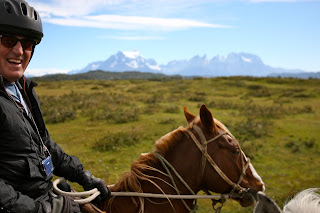 (photo by Vince Cummings)
(photo by Vince Cummings)Later in the day, Vincent went riding in the meadows outside of the park and saw this extraordinary salmon – 2.5 feet long. It is actually a Canadian species, imported by Chile, which escaped from a fish farm and has now taken up residence in the glacial lakes that empty into the ocean:

 (photos by Vince Cummings)
(photos by Vince Cummings)Roger and Helge left this morning at 8:00 a.m. and did not return until 8:00 p.m. – they had a terrific trip:
 (photo by Helge Pedersen)
(photo by Helge Pedersen)We plan to remain here for another 2 nights.
March 11
We got a late start after an unhealthy breakfast and drove up to a scenic vista for a photo shoot.
The wind was howling – above 40 mph. Vincent was not intoxicated here, but just having trouble standing up:
Helge was oblivious to the wind – he is now an artist-photographer in his element:
We spent the day taking video and stills – Helge uses a HD video camera and has taken an enormous amount of film and stills on this trip (1 Terabyte). High definition accounts for much of this huge number of memory, and in all probability only a small percentage will find its way into the video he’s producing about the trip.
Here are some shots of Helge “catching the wind” at a beautiful overlook:
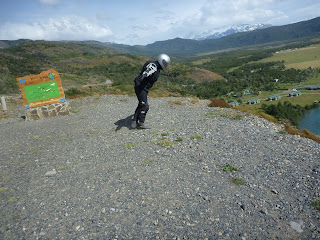
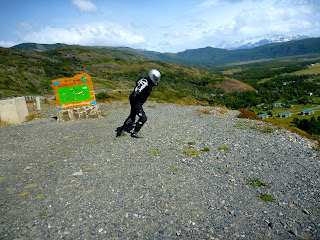 (photos by Vince Cummings)
(photos by Vince Cummings)Vincent also shares some shots that he took throughout the day:
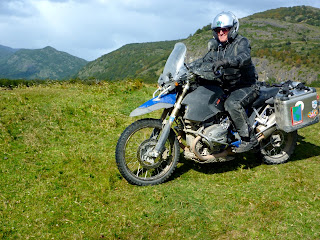
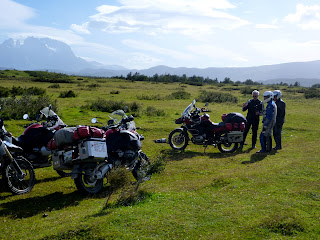

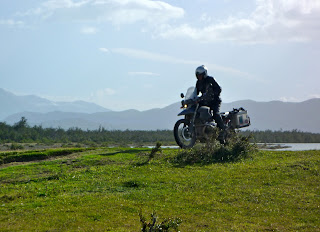
This river has the sort of chop that you see in the Gulf Stream when the wind blows from the north and the Gulf Stream flows from the south:
It’s interesting to watch the clouds as they cross over the spires:
The spires rise approximately 9,000 feet, and the clouds, to a large degree, vanish as they pass over the spires, dumping snow as they pass, which feeds the glacier. By the time they pass over the spires, the clouds have been transformed from full and bushy to light and wispy. This leaves the topography on the right side of the range arid, with near-desert conditions.
I have pulled a muscle in my back (the one you would use rowing a boat), so it’s difficult for me to stand up and tackle rough terrain. We have lunch and I take the rest of the day off to ice my back.
This gave me some time to complete a task I had begun earlier while the others were tied up watching the exciting movement of the glacier: brainstorming award names to properly recognize the four mighty motorcycles on which we have relied.
The coveted Palomo award, named after the horse of Simon Bolivar (the hero of South American independence) goes to my motorcycle, an HP2 with modifications.
It receives this honor for a variety of reasons, but mostly because it has been much maligned by the other three who have brand new BMW Adventurers, heavy motorcycles with all sorts of fancy gadgets (anti-lock brakes, traction control, “on-the-fly” suspension-adjustment, a tire pressure controller, and a variety of others). I hear that next year Nieman Marcus will offer a version of the Adventurer with a mink seat and sidecar bidet.
While I am resting, the other three go out for a ride, and while stopped on a small summit, all three of them were blown from their bikes. This episode provided the inspiration I needed for finalizing the award names for their bikes: Larry, Curly, and Moe.
Back to Top

Add A Comment